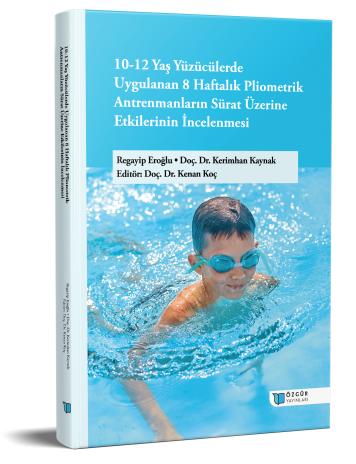
The Effects of 8-Week Plyometric Training on Speed in 10-12-Year-Old Swimmers
Synopsis
The aim of this study is to examine the effects of 8-week plyometric training on speed in 10-12 year-old swimmers and to contribute to the relevant literature. The population of the study consists of young swimmers in Turkey, while the sample of the study consists of a total of 24 male athletes randomly selected from those registered in the Erciyes Alfa Youth and Sports Club. Before the study, all athletes were given the necessary information about the measurements to be made and an Informed Voluntary Consent Form was signed. According to the Ethics Committee Approval Report obtained from Erciyes University, measurements were made before (pre-test) and after (post-test) the 8-week training program for both groups. The control group continued their regular training for 8 weeks, 3 days a week. The experimental group also did swimming training with the control group 3 days a week for 8 weeks and additionally performed plyometric training 3 days a week. In planning the movements, exercises that support development in the literature were used. The names of the exercises applied to the groups participating in the research are explained below in bullet points. Before the plyometric exercises were applied, the athletes warmed up with dynamic warm-up movements for 10-15 minutes. At the end of the exercises, cooling movements were applied for 5-10 minutes to prevent injuries. These cooling movements included stretching and relaxation exercises. The data were analyzed using the IBM SPSS 21 package program. The Shapiro Wilk test was performed to learn the normality distributions of the data, and it was determined that the data showed abnormal distribution according to the results. Descriptive statistical analyses were performed on the values related to the height, age, body fat percentage (BFP), weight, body mass index (BMI), and measurement variables of the athletes. The Wilcoxon Signed Ranks analysis was used to measure the difference between the pre-test and post-test measurements of the groups. The significance level in the study was determined as P<0.05*. In this study, the effects of 8-week plyometric training on BMI, BFP, back strength, leg strength, grip strength, shoulder width, vertical jump performance, and speed performance in 10-12 year-old swimmers were examined. The findings of the study showed that 8-week plyometric training had no significant effect on BMI and BFP in 10-12 year-old swimmers. However, it was observed that plyometric training provided a significant improvement in back strength, leg strength, grip strength, vertical jump performance, and 50-meter and 100-meter freestyle speed performance.

